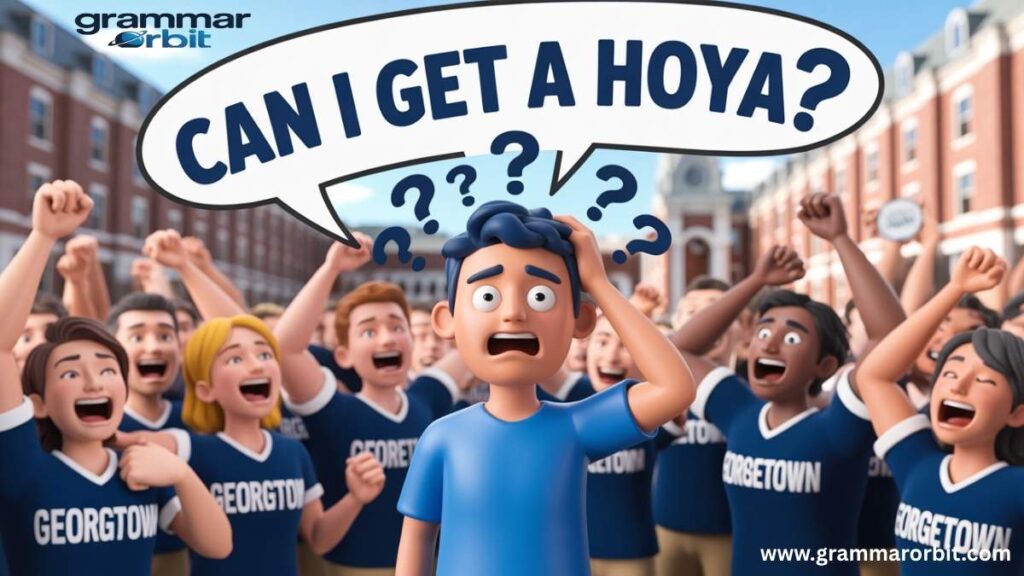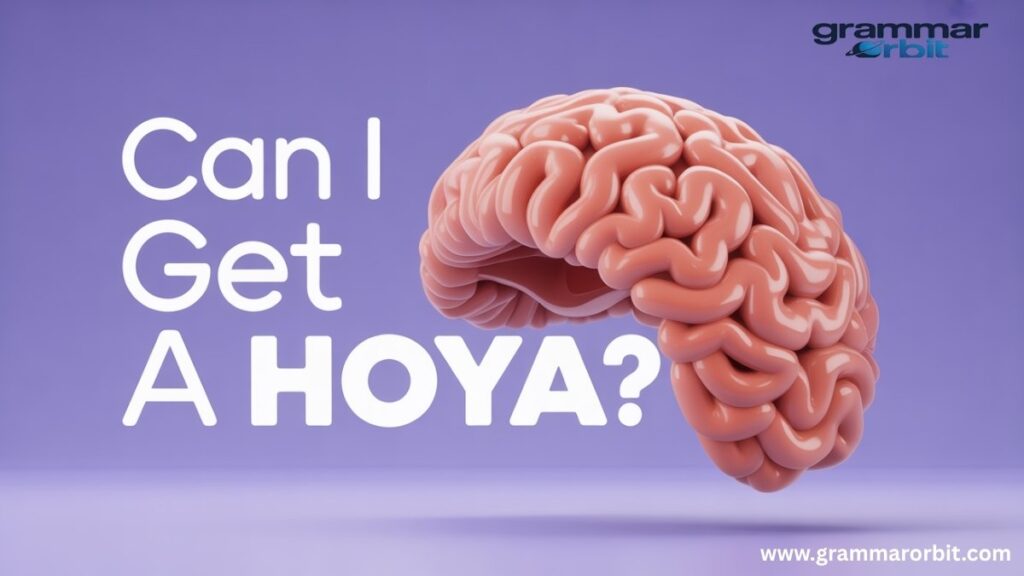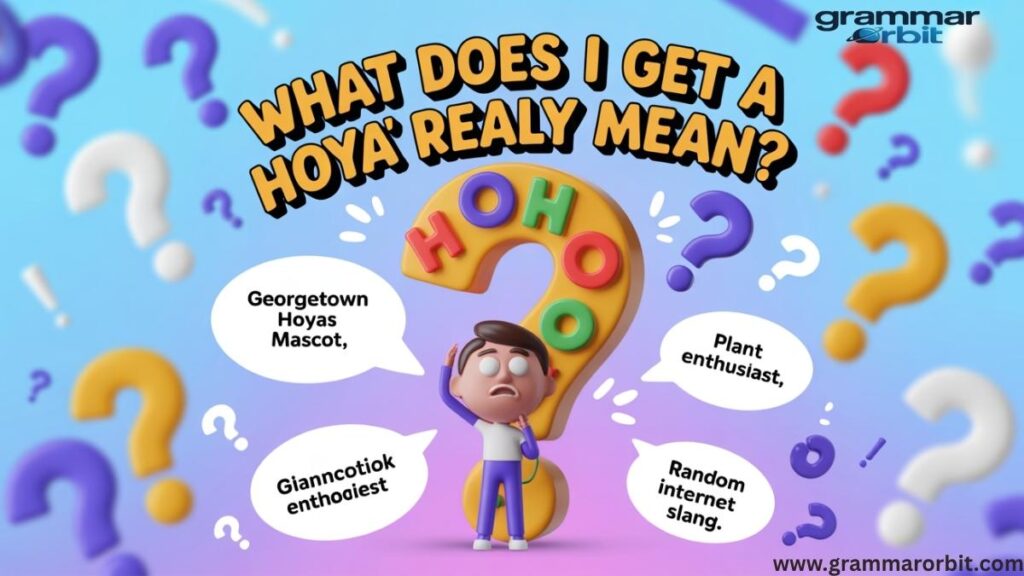Ever been scrolling through TikTok, grinning at a golden retriever video, when someone leans into the camera and asks, “Can I get a hoya?” You pause, mid chip crunch. Is it a plant? A snack? Some newfangled dance? Your brain short-circuits. Friend, you are not alone. This isn’t a literal question it’s a secret handshake for the digital age, a joyful call for a smile that’s taken the internet by storm. Let’s decode this bizarre, delightful phrase together, so you’re never left wondering what does ‘can I get a hoya’ mean ever again.
The Core Meaning of “Hoya”: It’s a Vibe, Not an Object

If you’re trying to understand what does hoya mean, the first step is to forget about dictionaries. The meaning of hoya slang isn’t found in a definition; it’s found in the feeling it creates.
At its heart, the phrase is a social bid for connection. When someone asks you for a hoya, they are:
- Requesting a Smile: This is the most direct interpretation. It’s a soft, non-demanding way of saying, “Give me a smile!” or “Show me you’re happy!”
- Building Hype: In group settings, especially online, it functions like a digital rallying cry. It’s similar to shouting “Let’s goooo!” to pump up your friends before a game.
- Checking Your Mood: Among friends, it can be a playful check-in. A downcast friend might be met with a gentle, “Hey, can I get a hoya?” as a way to lift their spirits.
The magic of the phrase lies in its ambiguity. Because “a hoya” isn’t a real thing, the listener is free to interpret it. Your hoya might be a grin, a nod, a cheerful comment, or just a feeling of agreement. It’s collaborative and open-ended.
Think of it like the game Marco Polo. One person puts out the call (“Marco!”) and the response (“Polo!”) confirms connection and location. “Can I get a hoya?” works the same way. The call demands a response that says, “I’m here with you in this positive moment.”
Tracing the Roots: From K Pop Fans to Your For You Page
The origin story of “can I get a hoya” is a tale of linguistic evolution that highlights the powerful creativity of fan cultures. Contrary to some guesses, it has no direct link to the military term “hooah” or the plant Hoya. Its true birthplace is in the world of K Pop, specifically with the global supergroup EXO.
Here’s how it happened:
- The Fanclub: EXO’s official fanclub is named EXO-L. The “L” stands for “Love,” and it also fits between E and X in the alphabet, symbolizing the link between the band and its fans.
- The Fanchant: During concerts and events, a common call-and-response chant developed. A member would shout “Let’s get it!” and the crowd of EXO-Ls would roar back, “EXO-L!“
- The Phonetic Shift: This is the crucial step. To non-Korean ears, and when shouted by thousands, “EXO-L” can sound a lot like “eh-ko-el” or even “eh-yo-el.” International fans online, particularly on platforms like TikTok, began to mishear and reinterpret the chant.
Through repeated use in memes and videos, “Let’s get it, EXO-L!” was slowly trimmed and morphed. The “Let’s get it” part transformed into the more question-like “Can I get a,” and the misheard “eh-yo-el” solidified into the catchy, nonsensical word “hoya.”
This phenomenon isn’t unique. Internet culture constantly remixes and repurposes sounds and phrases. The journey from a specific K Pop fanchant to a universal phrase for positivity is a perfect example of how online culture creates new language.
The TikTok Boom
TikTok acted as a supercharger for this trend. The platform’s algorithm favors participatory, easy-to-replicate sounds and phrases. The “can I get a hoya” meme was perfect: it was short, catchy, and invited a simple, engaging response. It quickly escaped the confines of K Pop fan spaces and became a mainstream TikTok trend, used by everyone from influencers to everyday users just looking to share a good vibe.
What Does “Smoke Show” Mean? The Surprising Truth Behind
How to Respond to “Can I Get a Hoya”: A Menu of Options

Now for the practical part. Someone has just hit you with the phrase. What do you do? How to respond to can I get a hoya is simple, but you have a few great options depending on the context.
Your main goal is to reciprocate the positive energy. Here’s a quick guide:
| Situation | Best Response | Why It Works |
|---|---|---|
| In Person / On Video Call | A genuine, physical smile. It’s the classic, no-fail hoya response. | It’s direct, human, and fulfills the core request perfectly. |
| In a TikTok Comment Section | Replying with “hoya!” or emojis like or. | It participates in the communal aspect of the trend and keeps the vibe going. |
| With Friends (Playfully) | A verbal “You got your hoya!” or an enthusiastic “Hoya!” while smiling. | It’s active engagement that shows you’re in on the joke and share the positivity. |
The key is to avoid breaking the spell. Responding with confusion (“What’s a hoya?”) or ignoring the request entirely can feel like a social fumble. The phrase is a gift of positivity; the best hoya response is to accept it and give a little back.
Where You’ll Hear It: Mapping the “Hoya” Ecosystem
The hoya meme has found a home in specific corners of the internet and real life. You’re most likely to encounter it in these spaces:
- TikTok & Instagram Reels: This is the phrase’s natural habitat. It’s used in video captions, as a spoken hook in short clips, and flooded in the comments. It’s a powerful tool for creators to boost engagement and build a sense of community.
- Twitch & Discord Livestreams: In live chat environments, “can I get a hoya” acts as a quick hype-building tool. A streamer might say it to energize their audience before a big moment in a game, and the chat will explode with “HOYA” in response.
- Real-Life Conversation: You’ll primarily hear this among friends who are deeply online. It’s used as a playful, in-the-know greeting. For example, if a friend seems quiet, you might nudge them and say, “Hey, can I get a hoya?” to check in on them.
Tweek vs Tweak Clarifying the Difference and Usage
Beyond “Hoya”: The Universe of Viral Call and Response

“Can I get a hoya” doesn’t exist in a vacuum. It’s part of a rich tradition of call and response memes and explosive Gen Z slang that dominates social media trends.
Let’s place it in context with other famous phrases:
- Sheesh: An expression of mock disbelief or impressed approval. While “hoya” asks for a reaction, “sheesh” is the reaction.
- Let’s goooo!: A direct hype-builder, very similar in function to “hoya” but more focused on collective excitement for an upcoming event.
- Slay: A term of high praise and affirmation. You tell someone they “slay” after they’ve done something amazing. It’s the reward, whereas “hoya” is the request for the energy needed to “slay.”
- Skibidi: Unlike the others, “Skibidi” originates from a specific, absurd series of YouTube videos. It’s a pure nonsense word that signifies participation in a very particular meme culture, much like how “hoya” started.
It’s also interesting to compare it to older, pre-internet call-and-response cues. For years, wrestling fans would know to respond “What?” after Stone Cold Steve Austin’s iconic opening growl. And in the military, “Hooah!” serves as a versatile term for morale and agreement. The hoya meme is the latest, digital-native evolution of this very human desire for synchronized expression.
The Hidden World of the Soda Tab
The Bigger Picture: Why This Silly Sounding Phrase Matters

On the surface, “can I get a hoya” is just another silly internet trend, here today and gone tomorrow. But if you look closer, it reveals something deeper about how we communicate.
In a digital world that can often feel anonymous and hostile, this phrase is a tiny, powerful tool for building community. It’s a verbal handshake that says, “We’re part of the same group. We understand this joke. Let’s share a good feeling.”
The journey of hoya slang from a K-Pop concert to a global TikTok trend shows how creative and organic online culture can be. It’s a reminder that language is alive, constantly being rewritten by the people who use it every day. So the next time you see that phrase in the comments or hear it from a friend, you’ll understand. It’s more than a question. It’s an invitation. Now you know exactly what to say back to hoya. So go on, share that smile. You’ve got your hoya.
Reference: Cambridge Dictionary Definitions
Here’s a trusted source for clear word meanings:
Can I Get a Hoya FAQs
What does “Can I get a hoya” mean?
In simple terms, it’s a playful request for a positive reaction. When someone asks this, they’re not looking for an object. They are asking for a smile, some hype, or a moment of shared good vibes. Think of it as the digital-era version of saying, “Give me a smile!” but with a much friendlier and more collaborative tone.
What is meant by hoya?
The word “hoya” itself doesn’t have a dictionary definition. Its meaning is entirely defined by its use in the phrase “Can I get a hoya?” In this context, a hoya is the thing being requested which is your positive energy, your smile, or your agreement. It’s the symbolic unit of hype.
How do I say “Can I get a hoya”?
You say it just like it looks! Pronounce it as “HOY-uh.” The delivery is key. Say it with a friendly, expectant tone, often with a smile. You’re not demanding; you’re inviting. You’ll most often use it in casual, online-heavy conversations where everyone is likely to be in on the trend.
Why is “hoya” so popular?
Its popularity is a perfect storm of internet culture. It’s catchy, easy to say, and fills a social need. The phrase exploded on TikTok because it’s a fantastic engagement tool it directly asks the audience to participate, which creators and algorithms love. Its origin as a misheard K-Pop fanchant also gave it an air of being an “inside joke,” which people love to share and be part of.
What about the “Can I get a Hooyah song” meaning?
This is a common mix-up! The “Can I get a Hooyah song” is a completely different trend, often associated with military-style cadences or motivational videos. The word “Hooyah” (or “Hooah” in the U.S. Army) is a real military chant meaning “yes,” “understood,” or used to express morale. It’s a coincidence that they sound similar. The viral slang phrase “Can I get a hoya” comes from K-Pop, not the military.
conclusion
So, the next time someone hits you with a “Can I get a hoya?”, you’re officially armed and ready. Your can flash a brilliant, dentist approved smile. You can fire back a confident “Hoya!” that echoes through the digital halls. You are no longer a confused spectator in the grand theater of internet slang; you are a certified participant. Go forth and spread the good vibes. Just maybe avoid asking your dentist for one some requests are still better left online. You’ve got your hoya. Now share it.
JHON AJS is an experienced blogger and the creative voice behind the website grammarorbit.com, namely Grammar Orbit. With a keen eye for language and a passion for wordplay, he creates engaging grammar insights, word meanings, and clever content that make learning English enjoyable and interesting for readers.






